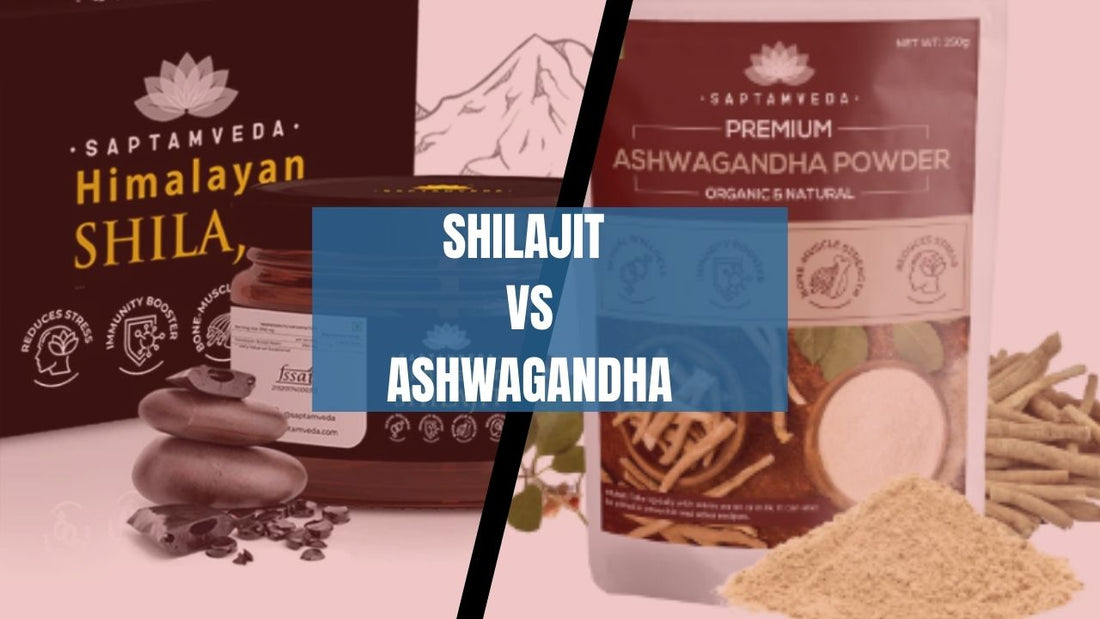
Shilajit vs. Ashwagandha: A Comparative Guide to Ayurvedic Adaptogens
Share
Shilajit and Ashwagandha are two ancient herbs with a rich history of use in traditional medicine. Both are known for their adaptogenic properties, which means they can help the body adapt to stress and maintain balance. They are also both considered rejuvenating herbs, and have been used to promote overall health and well-being.
Shilajit is a sticky substance found in the rocks of the Himalayas. It is a complex mixture of minerals, including fulvic acid, which is thought to be responsible for many of its health benefits. Shilajit has been used to treat a variety of conditions, including fatigue, anxiety, and inflammation.
Ashwagandha is an herb that is native to India, the Middle East, and parts of Africa. It is also known as Indian ginseng. Ashwagandha has been used to treat a variety of conditions, including stress, anxiety, insomnia, and infertility. It is also thought to be a testosterone booster.
Here is a table summarizing the key differences between Shilajit and Ashwagandha:
Shilajit vs Ashwagandha: A Comparative Overview
|
Aspect |
Shilajit |
Ashwagandha |
|
Source |
Derived from the Himalayan region through plant material decomposition |
Native to India, extracted from the root of Withania somnifera plant |
|
Composition |
Rich in minerals, fulvic acid, humic acid, trace elements, amino acids, vitamins, and secondary metabolites |
Contains withanolides, alkaloids, amino acids, sterols, saponins, flavonoids, vitamins, and minerals |
|
Traditional Use |
Integral to Ayurvedic medicine |
Rooted in Ayurvedic medicine |
|
Primary Benefits |
Vitality, energy, stress adaptation |
Stress management, immune support, vitality |
|
Active Compounds |
Minerals, fulvic acid, humic acid |
Withanolides, alkaloids, amino acids, sterols, saponins |
|
Adaptogenic Properties |
Yes, considered an adaptogen |
Yes, classified as an adaptogen |
|
Stress Reduction |
May aid in stress adaptation and reduction |
Known for its potential to manage stress and anxiety |
|
Potential Side Effects |
Generally considered safe, individual reactions may vary |
Generally considered safe, may interact with certain medications |
|
Dosage Recommendations |
Varies based on form and source |
Typical dosages range from 300-600 mg of standardized extract per day |
|
Cautions |
Source from reputable suppliers, consult healthcare professional |
Consult healthcare professional before use, especially for individuals with underlying health conditions |
|
Available Forms |
Capsules, resin, powder |
Capsules, powder, tincture, extract |
|
Scientific Research |
Ongoing research, more studies needed |
Ongoing research, more studies needed |
|
Shilajit vs Ashwagandha for Sexual Health |
||
|
Libido Enhancement |
Believed to indirectly contribute to sexual health |
May help improve libido and sexual function |
|
Aphrodisiac Properties |
Historical use suggests aphrodisiac properties |
Recognized for potential aphrodisiac effect |
|
Hormonal Balance |
Believed to support hormonal balance, influencing sexual health |
May have adaptogenic effects on hormones, impacting sexual well-being |
|
Fertility Support |
Believed to support hormonal balance, influencing sexual health |
May have adaptogenic effects on hormones, impacting sexual well-being |
|
Erectile Function |
May potentially contribute to improved erectile function |
Some studies suggest it may support erectile function. |
|
Sperm Quality |
Believed to have potential benefits for sperm quality and motility |
Some research indicates it may improve sperm quality |
|
Menstrual Health |
Limited traditional use for women's reproductive health |
May support menstrual health in women |
Both Shilajit and Ashwagandha are generally safe when taken as directed. However, there are some potential side effects, including diarrhea, nausea, and dizziness.
It is important to talk to your doctor before taking either of these herbs, especially if you are pregnant or breastfeeding.
FAQ:
Q. What is difference between shilajit and ashwagandha?
A. The difference between Shilajit and Ashwagandha lies in their unique benefits. Shilajit is renowned for promoting sexual wellness, vitality, and strength, while Ashwagandha is recognized for boosting immunity and safeguarding the body from cellular damage.
The dilemma often arises when individuals weigh the differences between Shilajit and Ashwagandha, as their distinct advantages may intersect, making it challenging to determine which one to choose.
Q. Which one is better Ashwagandha or Shilajit?
Ans. When comparing Ashwagandha and Shilajit, it's worth noting that Shilajit boasts a higher mineral concentration than Ashwagandha. Additionally, it serves as a rich source of amino acids and fatty acids.
In contrast, Ashwagandha is abundant in antioxidants and houses various vitamins, such as vitamin C and vitamin E
